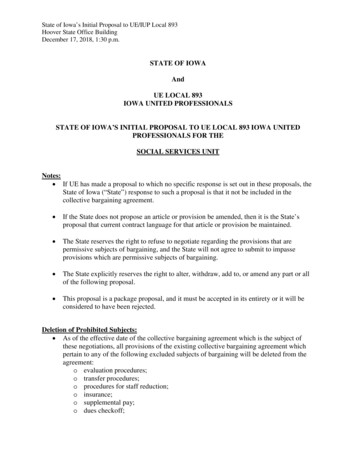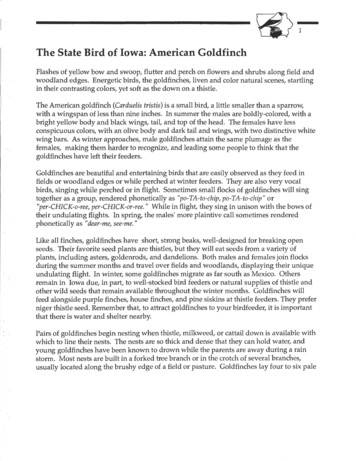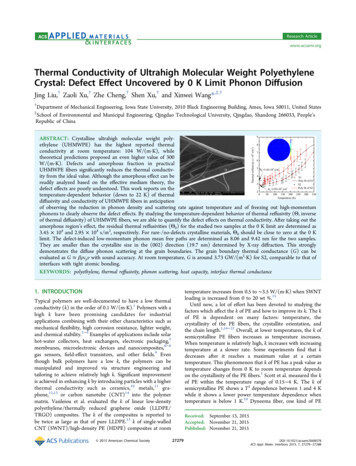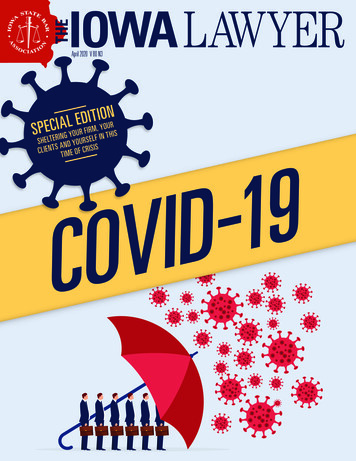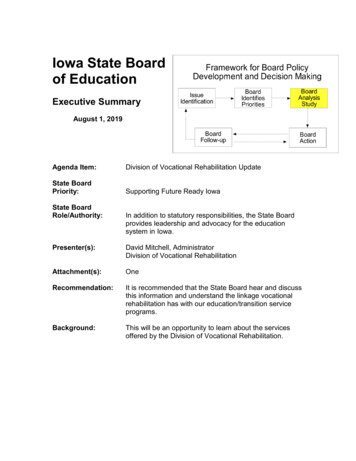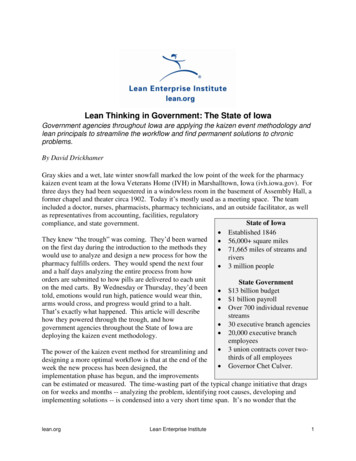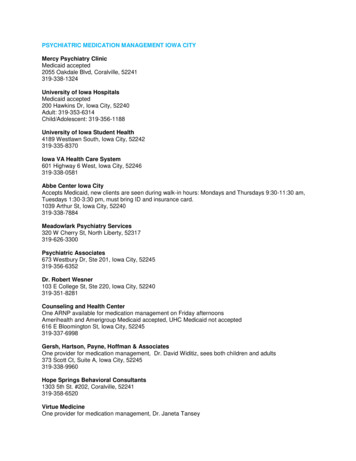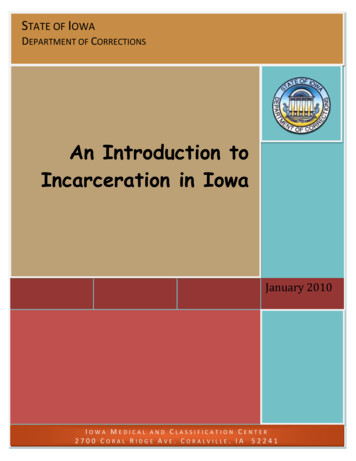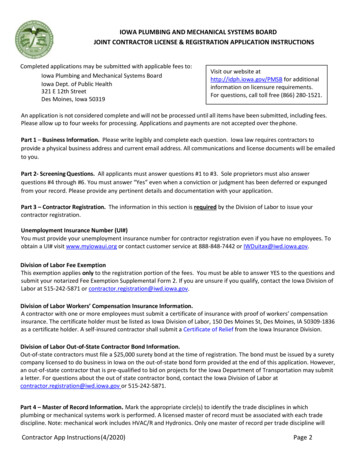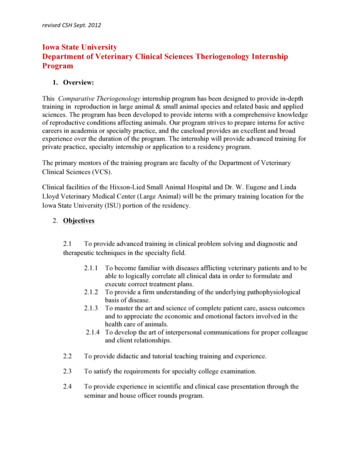
Transcription
revisedCSHSept.2012Iowa State UniversityDepartment of Veterinary Clinical Sciences Theriogenology InternshipProgram1. Overview:This Comparative Theriogenology internship program has been designed to provide in-depthtraining in reproduction in large animal & small animal species and related basic and appliedsciences. The program has been developed to provide interns with a comprehensive knowledgeof reproductive conditions affecting animals. Our program strives to prepare interns for activecareers in academia or specialty practice, and the caseload provides an excellent and broadexperience over the duration of the program. The internship will provide advanced training forprivate practice, specialty internship or application to a residency program.The primary mentors of the training program are faculty of the Department of VeterinaryClinical Sciences (VCS).Clinical facilities of the Hixson-Lied Small Animal Hospital and Dr. W. Eugene and LindaLloyd Veterinary Medical Center (Large Animal) will be the primary training location for theIowa State University (ISU) portion of the residency.2. Objectives2.1To provide advanced training in clinical problem solving and diagnostic andtherapeutic techniques in the specialty field.2.1.1To become familiar with diseases afflicting veterinary patients and to beable to logically correlate all clinical data in order to formulate andexecute correct treatment plans.2.1.2 To provide a firm understanding of the underlying pathophysiologicalbasis of disease.2.1.3 To master the art and science of complete patient care, assess outcomesand to appreciate the economic and emotional factors involved in thehealth care of animals.2.1.4 To develop the art of interpersonal communications for proper colleagueand client relationships.2.2To provide didactic and tutorial teaching training and experience.2.3To satisfy the requirements for specialty college examination.2.4To provide experience in scientific and clinical case presentation through theseminar and house officer rounds program.
revisedCSHSept.20122.5To provide experience in the preparation and submission of scientific articles forpublication and/or presentation.3. Prerequisites3.1 Candidates must have a DVM or an equivalent degree.3.2 Candidates must have successfully completed the National Board examination or itsequivalent in the certifying country; must be approved to practice veterinary medicinein the United States.3.3 Candidates must be/become licensed to practice veterinary medicine in the state ofIowa prior to employment.3.4 Candidates must have the goal of practicing state of the art medicine and surgery orspecialty board certification.3.5 Candidates must have a satisfactory moral and ethical standing.4Faculty Advisor4.1 The intern will be assigned to a faculty advisor (mentor) the first month of theprogram. This may be the same or a different person than the Program Director.4.2 Responsibilities of the advisor/ mentor include:4.2.1 The advisor will directly oversee the intern’s training and act as a liaisonwith other faculty members in the College of Veterinary Medicine.4.2.2 Direction and coordination of the clinical program.4.2.3 Advice toward research, publications, and preparation for Specialty Boardapplication.4.2.4 Approval of requests by faculty for the intern to participate in teaching,research or other activities.4.2.5 Advising on preparation and reviewing presentation performance ofseminars and case rounds.4.2.6 Professional guidance.5. VCS House Officer Seminar/ Rounds ProgramsThe VCS Seminar/Rounds Program are designed to provide the House Officer the opportunity toreceive and present interesting, unusual, or difficult clinical case material utilizing a problemoriented approach to professional colleagues and to develop manuscripts for publication. The
revisedCSHSept.2012intern will participate with the other VCS house officers on a rotating basis and will make atleast 1 case presentation in House Officer Rounds during the year.The seminar series is designed to provide the House Officer with the opportunity to research andpresent scientific information to professional colleagues.5.15.2One seminar will be prepared and given during the program.5.1.1 House Officer attendance at all VCS Seminar/Rounds sessions is required.Attendance will be taken at the beginning of each session.5.1.2 House Officer will be required to present an additional seminar if theyhave more than one unexcused absence during the program year. Allabsences must be accounted for by communication with the Leader of theHouse Officer Committee and advisor.5.1.3 Excused absences include the following: illness, annual leave, attendanceor participation in a continuing education program, presentation of astudent lecture, scheduled out-rotation or special service requirements perrequest of advisor. All other absences are unexcused unless deemedexcusable by the HO advisor.House Officers attend and present in a variety of organized rounds and seminarsin support of their intern training and teaching experience. The menu of roundsand seminars is tailored to assist interns in literature review and broadenknowledge base and to expose them to a broad range of clinical and academicexperiences. Schedules are subject to change but include:Type:Service Rounds w/studentsVCS Seminar/RoundsService Resident RoundsRadiology-Pathology RoundsEvidence based medicine RoundsMorbidity/Mortality RoundsStudent Grand RoundsJournal ClubTextbook Review SessionAnatomic Pathology ecommendedrecommendedTeaching Program6.1Frequency:per programweekly (Thursday 8 a.m.)per servicemonthly (Tuesday 8 a.m.)monthly (Tuesday 8 a.m.)bimonthly (Tuesday 8 a.m.)weekly (Friday 8 a.m.)weeklyweeklyweeklyThroughout the program interns will be viewed as role models by bothprofessional students and staff. They should always present themselves in aprofessional manner.
revisedCSHSept.20126.2The intern will participate in clinical instruction and may participate in theevaluation of veterinary students assigned to clinics.6.3The intern will participate in preclinical didactic lecture and laboratory instructionas assigned by his/her advisor.7.0Board Certification7.1An important credential in veterinary medicine is board certification in a specialtyarea. One of the objectives of the program is to guide the intern in selecting aspecialty area for board certification.7.2Interns should seek faculty advice early in their program as applications to theVIRMP are due in the Fall of each year. Resume, letter of intent and referencesare required for application. Publications and research experience are oftenhelpful in obtaining residency positions.8.0Clinical ProgramBelow is a description of the 54 weeks program of acation1weekorientation8.1 Intern Year8.1.1 Weeks of training described in table above.
.1.89The intern will participate in the instruction of clinical students.Participation in CVM student laboratories will be assigned.The intern will participate in house officer rounds, ward rounds, journalclub, special topic conferences, seminars, and other scheduledconferences of the VMC. He/She will attend other scheduled seminarsin the CVM as time permits.The intern will present 1 seminar and 1 case report (to faculty andhouse officers) on topics of interest to the intern during VCSSeminar/Rounds sessions.The intern is encouraged to attend and participate in continuingeducation meetings sponsored by the CVM or by local and regionalveterinary organizations.The intern is encouraged to apply for specialty training in their area ofgreatest interest through the VMRIP matching program in the Fall.The intern is encouraged to prepare a research proposal; review it withhis/her faculty mentor, and submit it for funding consideration.The intern assists faculty who are providing primary night and weekendemergency duty. The intern will be available for emergency assistanceapproximately 75% of nights and weekends; however, this will varywith the seasonality of reproductive emergency caseload. The internwill schedule their availability with faculty.Scholarly ActivitiesThe Department of Veterinary Clinical Sciences encourages its interns to participate inscholarly activity such as literature reviews, and basic, applied or clinical research. Tothat end the intern is encouraged to:9.1 Design a research project to address a specific question or problem in the discipline.9.2 Write a research grant proposal that may be used to seek funding for the project.9.2.1 The anticipated timeline for completion of the project is by December 1st.9.2.2 Proposals are to be submitted for funding. .9.3 Conduct the research according to the experimental design.9.3.1 Research is to be conducted during off-clinic time.9.3.2 Completion is expected during the internship.9.4 Analyze and report the results of the project9.4.1 Research is to be presented to the VCS faculty and House Officers duringseminar.9.5 Publication of these results in a refereed journal is strongly encouraged9.5.1 A manuscript suitable for publication is to be completed prior to theconclusion of the program.10 Facilities and Equipment10.1The College of Veterinary Medicine Teaching Hospital (VTH) is a fully accreditedhospital (AAHA, AALAC) with full AVMA accreditation.The facilityencompasses the Iowa State Veterinary Diagnostic Laboratory, an accredited
revisedCSHSept.2012(AAVLD) full service laboratory providing clinical pathology, histopathology,immunohistochemistry, immunology, microbiology, virology and toxicologysupport. The VTH contains full service small and large animal medicine andsurgery facilities.10.2 Library and other Literature ResourcesThe Veterinary Medical Library, housed within the College of VeterinaryMedicine building, contains both human and veterinary textbooks as well asbound serial publications. Parks library on main campus is easily accessible viadaily transport of holdings between libraries upon request. An extensivecollection of online journal subscriptions is available to the House Officers free ofcharge via the Interlibrary Loan/ Document Delivery service. Computer-basedretrieval systems MEDLINE, CAB and AGRICOLA abstracts are availableelectronically. A wide selection of current journals is available in the library andonline.10.2.1 Each intern is required to be familiar with pertinent articles in the currentliterature. Reasonable expenses for photocopying are defrayed by the Hospital.11 Evaluation and Reappointment11.1A written critique will be provided at least every 6 months by the advisor or section.The critique will cover:11.1.1 Professional ability; to include theoretical knowledge and application ofthat knowledge, clinical skills, tutorial skills, and scholarly activity.11.1.2 Hospital services; to include communication skills, patient care, medicalrecord quality, emergency duty quality, and adherence to VMCprotocol.11.1.3 Personal characteristics; to include responsibility, initiative, interactionwith faculty, staff and students, deportment and leadership11.2 The intern will meet with his or her advisor on a quarterly basis to discuss theirprogress. A summary of the discussion will be signed by both advisor and HouseOfficer.11.3 In March of each year, the House Officer Committee will review the year'scritiques. Following that review, the committee will make a recommendationto the Head of the Department of Veterinary Clinical Sciences to:11.3.1 Award a certificate upon satisfactory completion of the program.11.3.2 Notify the intern of unsatisfactory performance and failure tosuccessfully complete the program.11.4 The intern will be asked to make an assessment of their program with suggestionsfor improvement. The evaluation form will be handed out in May or June and mustbe returned before completion of that year in July12 House Officer Committee
revisedCSHSept.2012The committee is comprised of a representative of each house officer program, the VCS Head(ex officio), and the Director of the VMC (ex officio). It will be responsible for:12.1 The selection of House Officers from the application pool (with the advice of thefaculty of the sponsoring discipline).12.2 Annual review of the House Officer's progress (in the ninth month of each year).12.3 Annual recommendation for reappointment of the House Officer or programcompletion.12.4 Program approval, renewal, oversight and establishment of policy.13 Employment and Benefits13.1Iowa State University residents and interns are classified as adjunct, non-tenureeligible faculty and as such are governed by the faculty current)13.2Iowa State University offers a competitive salary and a comprehensive benefitpackage to house officers. Full faculty benefits are provided, including medical,dental, and professional liability (limited). House officers are encouraged toinvestigate personal professional liability insurance ulty- ‐Benefit- ‐Summary- ‐2011.pdf)13.3 The annual salary for interns is approximately 26,000.00. The salary (not astipend) is published in the Directory of Internships and Residencies as publishedby the American Association of Veterinary Clinicians (www.virmp.org). Salary ispayable in monthly increments. Retirement contributions, social security, federaland state taxes are withheld from each paycheck.13.4 As employees of the University interns are considered full-time adjunct faculty andearn 16.0 hours per month of vacation/annual leave (192 hours or 24 days/year) and12.0 hours per month of sick leave.13.4.1 Annual leave may only be taken/granted for the amount of timeaccrued.13.4.2 Annual leave is to be taken when the house officer is not scheduled onclinic or emergency duty. Vacation requests must be made at least 2weeks in advance of the desired vacation time.13.4.3 After approval by the House Officer’s advisor, requests must be madeon the standard University Leave Form reviewed by the ProgramDirector/Coordinator and signed by the program’s Section Leader andthe Chair of the Department of Veterinary Clinical Sciences or theHospital Director.13.4.4 Accrued vacation time must be used during the term of the appointmentor it will be forfeited upon termination. Vacation must not be usedduring the final three weeks of the term of the appointment.13.5 A cell phone, desk, chair, place for book storage, and intern filing cabinet are alsoprovided for each House Officer. A computer system is provided with wordprocessing, spread sheet and presentation programs along with unlimited internetaccess and e-mail.
revisedCSHSept.201213.6 The Veterinary Medical Center operates year round. The intern will share withother house officers an emergency duty rotation. The rotation will commit the intern toa share of evening, weekend and holiday duty on a scheduled basis.13.7 Consultation Policy (Outside Employment)Concurrent employment of interns at a site other than Iowa State University,College of Veterinary Medicine during their program is allowed provided theactivity is approved by the House Officer’s advisor and the program director and aCVM Consultation Request Approval Form is completed and approved by thedepartment chair and the college dean prior to any consulting activities.14 Applications14.1 Candidates may apply for the Internship by completing:14.1.1 A standard residency online application (V.I.R.M.P. application).14.1.2 A statement of objectives for the internship and subsequent career goals.14.1.3 A transcript of his/her academic record.14.1.4 Three letters of reference from individuals currently familiar with theapplicant's professional status.14.1.5A curriculum vitae14.2 Selection is based on:14.2.1 The above documents.14.2.2 Interviews may be required.14.3For more information about this program, please contact Dr. Lawrence Evans,Iowa State University, College of Veterinary Medicine, Department of VeterinaryClinical Sciences, 1600 South 16th Street, Ames, Iowa 50011-1250. (Telephone 515294-1500; email: levans@iastate.edu ).14.4 Iowa State University does not discriminate on the basis of race, color, age,religion, national origin, sexual orientation, gender identity, sex, marital status,disability or status as a U.S. veteran. Inquiries can be directed to the Director of EqualOpportunity and Diversity, 3680 Beardshear Hall, (515) 294-7612.15 Appendices15.1 Faculty in support of the Program15.2 Code of Conduct & Collegiality15.3 Communication Tree15.4 Consultation Request15.5 House Officer Leave Request (in VCS office)15.6 House Officer Rounds Evaluation Form15.7 VCS Seminar Evaluation Form15.8HO Evaluation Form15.9 Other forms
revisedCSHSept.201215. 1 Faculty in Support of the Internship Programs:AnesthesiologyDean H. Riedesel, DVM, PhD, Diplomate ACVABonnie H. Kraus, DVM, Diplomate ACVS, Diplomate ACVAMartha L. Buttrick, DVMChristopher Kelly, DVMCardiologyWendy A. Ware, DVM, MS, Diplomate ACVIM (Cardiology)DermatologyJames O. Noxon, DVM, Diplomate ACVIM (Internal Medicine)Elizabeth May, DVM, Diplomate ACVDDiana Miller, DVMDiagnostic ImagingKristina G. Miles, DVM, MS, Diplomate ACVRElizabeth A. Riedesel DVM, Diplomate ACVREmergency and Critical Care MedicineMichael Curtis, DVM, PhD, Diplomate ACVAInternal MedicineJo Ann Morrison, DVM, MS, Diplomate ACVIM (Internal Medicine); Residency ProgramDirectorClaudia J. Baldwin, DVM, MS, Diplomate ACVIM (Internal Medicine) - practice limited toconsultationAlbert E. Jergens, DVM, PhD, Diplomate ACVIM (Internal Medicine)Robert R. King, DVM, PhD, Diplomate ACVIM (Internal Medicine); Associate HospitalDirectorKrysta Deitz, DVM, MS, Diplomate ACVIM (Internal Medicine)Cody Alcott, DVM, Diplomate ACVIM-LABrett Sponseller, DVM, PhD, Diplomate ACVIM-LADavid Wong, DVM, MS, Diplomate ACVIM-LA, ACVECCNeurologyRod Bagley, DVM, Diplomate ACVIM (Neurology), Department Chair and ExecutiveHospital Director - practice limited to consultationNicholas Jeffery, BVSc PhD, Diplomate ECVIM (Neurology)OncologyLeslie E. Fox, DVM, MS, Diplomate ACVIM (Internal Medicine)OphthalmologyDavid Whitley, DVM, MS, Diplomate ACVOGil Ben-Sholmo, DVM, PhD, Diplomate ACVORachel Allbaugh, DVM, MS, Diplomate ACVOPrimary CareBianca Zaffarano, DVMBrenda Mulherin, DVM
revisedCSHSept.2012Linda K. Kauffman, DVMSusan E. O'Brien, DVMSurgery -CASKarl Kraus, DVM, Diplomate ACVSMary Sarah Bergh, DVM, MS, Diplomate ACVS, Diplomate American College of VeterinarySports MedicineCheryl Hedlund, DVM, MS, Diplomate ACVSWilliam D. Hoefle, DVM, MS, Diplomate ACVSIngar A. Krebs, DVMSurgery – EquineScott McClure, DVM, PhD, Diplomate ACVSLarry Booth, DVM, MS, Diplomate ACVSStephanie Caston, DVM, Diplomate ACVSKevin Kersh, DVM, Diplomate ACVSJennifer Schleining, DVM, MS, Diplomate ACVSEric Reinertson, DVMTheriogenologyLawrence E. Evans DVM, PhD, Diplomate ACTLinda K. Kauffman, DVMNyomi Gallow-Kersch, DVM
revisedCSHSept.201215.2Code of professional conductA code of conduct is meant to help guide professionals in proper interaction with otherprofessionals. No document can be all inclusive or specific. This list is meant to direct aprofessional veterinarian, or veterinary student, toward proper conduct and interactions withinthe hospital and college.1. Each clinician (faculty, residents, and interns) has numerous interactions with veterinarystudents and should realize that they are role models for these students. Professional attireand language, and appropriate interactions with referring veterinarians are expected at alltimes. All clinicians must take care to never use denigrating or insulting language whenreferring to other veterinarians including referring veterinarians, or to students.2. Clinicians should refer to each other and other veterinarians as “Doctor” while in thehospital and should instruct students to do the same.3. All clinicians should strive for the best care for all patients in our hospital. It is inevitablethat there will be differences of opinion as to what that best care entails. There is also thepossibility that a clinician, for whatever reason, is not caring for a patient to a standardappropriate for this hospital. If a clinician feels that a patient is not cared forappropriately or to a certain standard, then that clinician should discuss their concernswith the attending clinician in a collegial manner (in private venue, not in front ofcolleagues or students).4. It is appropriate to collegially discuss the care of cases in case rounds and in the presenceof the attending clinician on the case. It is inappropriate to question the care of a patientby another clinician in the presence of clients, students, house officers, referringveterinarians, or attending clinicians outside of case rounds or without the presence of theattending clinician. This is a severe breach of medical ethics and may warrant correctivemeasures.5. Students and clinicians come from diverse backgrounds and cultures. It is inappropriateto discuss another professional’s personal life while conducting hospital business.College of Veterinary Medicine Collegiality Policy:All CVM employees have a responsibility to maintain a positive workplace that is free ofdiscrimination and harassment. Collegial interactions with all co-workers in the CVM arerequired. Faculty and staff are expected to model safe and fiscally responsible behavior forstudents, and are expected to be in compliance with established policies of the CVM and IowaState University (including the ISU Code of Computer Ethics and Acceptable Use, biosafetyregulations, OSPA, purchasing, etc.). All faculty and staff are expected to participate in theannual performance evaluation process.
vedH.O.(Service1)meetwithOn- twithOn- ‐clinicservice(2)facultyConflictunresolvedOn- ‐clinicservice(1)facultyOn- nresolved Protocolestablished ToDept.Head(program'issues) isedwhendeemedappropriate.
siion )ToHospitalDirector(hospitalissues)
revisedSHSept.2R01215.4CConsultingequestCollege of Veterinary MedicineIowa State UniversityCONSULTINGREQUESTAPPROVALFORMThis form must be approved by the Department Chair/Unit Director and Dean prior to consulting y?Reminder:Allfull- ir/UnitDirectorCollegeDean
vailableintheVCSoffice.
aluationCommentsE excellentG goodN priatecasefollow- appropriatelength)Useofproblem- odylanguage/enthusiasm(nervous,relaxed,self- atehumor,self- alComments:Evaluator:
revisedCSHSept.201215.7Seminar on1.DefinitionofSubject:introduction,0- on:0- ‐15pts3.Qualityofmaterial,scientificdepth0- ‐15pts4.Presence:Speakingabilitya.Clarity0- ‐10ptsb.Rateofdelivery0- ‐10ptsc.Enthusiasm,expressiveness,mannerisms0- ‐10pts5.Visualaids:slides&text,images,graphs0- ‐10pts6.Appropriatesummary?0- - ?0- ‐10ptsTotalComments:Evaluator:
Person being exceedsjobrequirementsCriteria EvaluatedDependability: Reliability, extent to whichemployee can be counted on to complete assignedtasks, meet position objectives, and have goodattendance.Motivation: Initiative, interest and “self-starting,”enthusiastic attitude results in a high level ofperformance. Continued high rate of effectiveeffort.Communication Skills: Appropriate and clearpresentation of ideas verbally and in writing.Possesses the ability to effectively communicatewith clients.Interpersonal Relations: Works effectively andharmoniously with others including staff, faculty,and students.Team Skills: Advances goals of team above selfinterests with supportive, cooperative, and positivebehavior.Planning/Organizing/Problem Solving:Determines what needs to be done, prioritizes, andplans time wisely. Completes tasks on time.Work Output: Meets job standards relative toquality and quantity of work output.Judgment: Displays effective thought, vision,creativity, and reasoning, which results inappropriate action within limits of jobresponsibility.Date of evaluation:Comments
revisedCSHSept.2012Professionalism: Maintains professional imagewith appropriate hygiene, appearance, language,ethical and humane behavior.Adaptability: Willingly accommodates changingsituations and unexpected needs of the position.Supports long-term positive change. Workstowards objectives even when frustrated,discouraged, tired, or stressed.Knowledge of Discipline: Understands thefundamentals, methods, and procedures required inpresent job.Technical Skills: Possesses the technical skills tofulfill the needs of the position. Instills fullconfidence among colleagues.
4.2 Responsibilities of the advisor/ mentor include: 4.2.1 The advisor will directly oversee the intern’s training and act as a liaison with other faculty members in the College of Veterinary Medicine. 4.2.2 Direction and coordination of the clinical program. 4.2.3 Advice toward re
